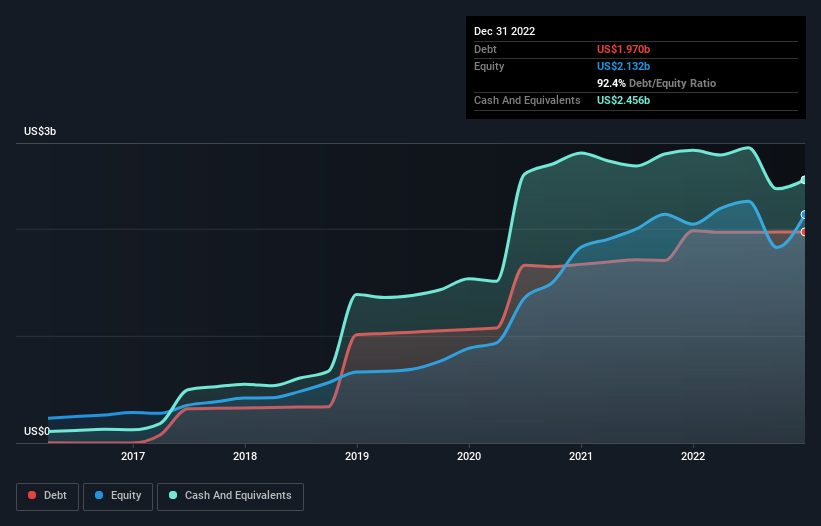- United States
- /
- Medical Equipment
- /
- NasdaqGS:DXCM
These 4 Measures Indicate That DexCom (NASDAQ:DXCM) Is Using Debt Safely

David Iben put it well when he said, 'Volatility is not a risk we care about. What we care about is avoiding the permanent loss of capital.' When we think about how risky a company is, we always like to look at its use of debt, since debt overload can lead to ruin. As with many other companies DexCom, Inc. (NASDAQ:DXCM) makes use of debt. But is this debt a concern to shareholders?
When Is Debt Dangerous?
Debt is a tool to help businesses grow, but if a business is incapable of paying off its lenders, then it exists at their mercy. Part and parcel of capitalism is the process of 'creative destruction' where failed businesses are mercilessly liquidated by their bankers. However, a more usual (but still expensive) situation is where a company must dilute shareholders at a cheap share price simply to get debt under control. By replacing dilution, though, debt can be an extremely good tool for businesses that need capital to invest in growth at high rates of return. When we examine debt levels, we first consider both cash and debt levels, together.
See our latest analysis for DexCom
What Is DexCom's Net Debt?
As you can see below, DexCom had US$1.97b of debt, at December 2022, which is about the same as the year before. You can click the chart for greater detail. But on the other hand it also has US$2.46b in cash, leading to a US$485.9m net cash position.

How Strong Is DexCom's Balance Sheet?
The latest balance sheet data shows that DexCom had liabilities of US$1.84b due within a year, and liabilities of US$1.42b falling due after that. On the other hand, it had cash of US$2.46b and US$752.2m worth of receivables due within a year. So these liquid assets roughly match the total liabilities.
Having regard to DexCom's size, it seems that its liquid assets are well balanced with its total liabilities. So it's very unlikely that the US$46.8b company is short on cash, but still worth keeping an eye on the balance sheet. While it does have liabilities worth noting, DexCom also has more cash than debt, so we're pretty confident it can manage its debt safely.
In addition to that, we're happy to report that DexCom has boosted its EBIT by 47%, thus reducing the spectre of future debt repayments. When analysing debt levels, the balance sheet is the obvious place to start. But it is future earnings, more than anything, that will determine DexCom's ability to maintain a healthy balance sheet going forward. So if you're focused on the future you can check out this free report showing analyst profit forecasts.
But our final consideration is also important, because a company cannot pay debt with paper profits; it needs cold hard cash. DexCom may have net cash on the balance sheet, but it is still interesting to look at how well the business converts its earnings before interest and tax (EBIT) to free cash flow, because that will influence both its need for, and its capacity to manage debt. Over the most recent three years, DexCom recorded free cash flow worth 66% of its EBIT, which is around normal, given free cash flow excludes interest and tax. This cold hard cash means it can reduce its debt when it wants to.
Summing Up
We could understand if investors are concerned about DexCom's liabilities, but we can be reassured by the fact it has has net cash of US$485.9m. And we liked the look of last year's 47% year-on-year EBIT growth. So is DexCom's debt a risk? It doesn't seem so to us. The balance sheet is clearly the area to focus on when you are analysing debt. But ultimately, every company can contain risks that exist outside of the balance sheet. Be aware that DexCom is showing 1 warning sign in our investment analysis , you should know about...
Of course, if you're the type of investor who prefers buying stocks without the burden of debt, then don't hesitate to discover our exclusive list of net cash growth stocks, today.
If you're looking to trade DexCom, open an account with the lowest-cost platform trusted by professionals, Interactive Brokers.
With clients in over 200 countries and territories, and access to 160 markets, IBKR lets you trade stocks, options, futures, forex, bonds and funds from a single integrated account.
Enjoy no hidden fees, no account minimums, and FX conversion rates as low as 0.03%, far better than what most brokers offer.
Sponsored ContentNew: Manage All Your Stock Portfolios in One Place
We've created the ultimate portfolio companion for stock investors, and it's free.
• Connect an unlimited number of Portfolios and see your total in one currency
• Be alerted to new Warning Signs or Risks via email or mobile
• Track the Fair Value of your stocks
Have feedback on this article? Concerned about the content? Get in touch with us directly. Alternatively, email editorial-team (at) simplywallst.com.
This article by Simply Wall St is general in nature. We provide commentary based on historical data and analyst forecasts only using an unbiased methodology and our articles are not intended to be financial advice. It does not constitute a recommendation to buy or sell any stock, and does not take account of your objectives, or your financial situation. We aim to bring you long-term focused analysis driven by fundamental data. Note that our analysis may not factor in the latest price-sensitive company announcements or qualitative material. Simply Wall St has no position in any stocks mentioned.
About NasdaqGS:DXCM
DexCom
A medical device company, focuses on the design, development, and commercialization of continuous glucose monitoring (CGM) systems in the United States and internationally.
Flawless balance sheet with high growth potential.
Similar Companies
Market Insights
Community Narratives



